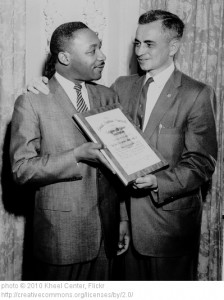In Divided by Faith, Emerson and Smith (2000) make a case, supported by U.S. history, that Evangelicals generally work within culture to spread the gospel, and, for some (perhaps many), taking action that is counter-cultural would expend energy and resources that could better be used spreading the good news of Jesus. Evangelicals, according to Emerson and Smith, take this stand because evangelism and discipleship are the first priority of the Church, a position that is difficult to argue against when one considers the Great Commission (Matthew 28:19-20).
Jesus did not die and rise from the dead in order to save nations, but to create a new holy people called out from among the nations (1 Peter 2:9-10). God does not save nations, but blesses or judges them according to the deeds of the leaders and citizens (Psalm 110:6). In part, because of this, there is an assumption, which I have subscribed to in the past, that the salvation of individuals will lead to a transformed society. That is true in theory, but, generally, numbers of people are not saved quickly enough to transform their culture. Revival may led to mass repentance, as in Nineveh (Jonah 3) or a Great Awakening, but it may also lead to institutional state religion (the Holy Roman Empire), forced conversion (the Crusades), or both (the Spanish Inquisition).
 I believe merely saying that evangelism and discipleship is the first priority of the Church leaves out at least one important priority. I like the vision of The Wesleyan Church, “Fulfilling the Great Commission in the spirit of the Great Commandment” (emphasis mine). Loving God and our neighbors cannot be separated from our commission as disciples (John 13:35). Furthermore, in order to transform a society, the social gospel and actions toward justice cannot be separated from the gospel of individual salvation. We are called to seek justice and love mercy, as well as walk humbly with our God (Micah 6:8).
I believe merely saying that evangelism and discipleship is the first priority of the Church leaves out at least one important priority. I like the vision of The Wesleyan Church, “Fulfilling the Great Commission in the spirit of the Great Commandment” (emphasis mine). Loving God and our neighbors cannot be separated from our commission as disciples (John 13:35). Furthermore, in order to transform a society, the social gospel and actions toward justice cannot be separated from the gospel of individual salvation. We are called to seek justice and love mercy, as well as walk humbly with our God (Micah 6:8).
How do you fully fulfill the Great Commission in the spirit of the Great Commandment?
- Stand against slavery in the modern world with The Orange Movement.
- Help those in need and transform your community with Love Inc.
- Seek justice with The Innocence Project.
References:
Emerson, Michael O. & Smith, Christian. (2000). Divided by faith: Evangelical religion and the problem of race in America. Oxford University Press.
©2012 Paul Tillman







Although not specifically directed at me, Jim Garlow has recently addressed the idea of culture transformation in his video “Pulpit Freedom – Can Change a Nation” on The Garlow Report
. While I stated “generally, numbers of people are not saved quickly enough to transform their culture” and pointed out some of our weaker moments in history when nations Christianized (actually denominationalized) themselves, Dr. Garlow points out that culture change may also happen by having a minority of people working together in key positions. I do not disagree with that. I do not speak for Dr. Garlow, but I wonder if he would extend or include within the idea of social justice as part of the gospel, the idea that in a democracy (representative republic) we have to opportunity, perhaps even obligation, to work towards a righteous society at many levels: individual, community, and governmental.